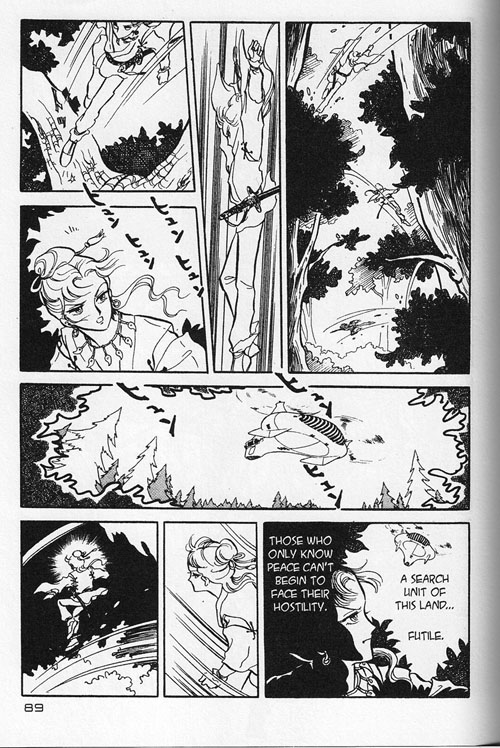 Roureville, Vols. 1-3 | By E. Hae | Published by NETCOMICS – Evan Pryce is a an acclaimed reporter for the New York Times, whose most recent story has earned him a spot on a terrorist hit list. When coworkers at the Times make it clear they want him out of the vicinity until things cool down, he is shipped off to the middle of nowhere to investigate a tabloid-esque ghost story tip, very much against his will. Having spent ten days searching vainly for an off-the-map town called Roureville, Evan is about to throw in the towel when luck appears suddenly in the form of a flustered priest who unintentionally leads him straight into the town. Though the ghost story appears to be unfounded, Roureville is fishy from the start and after Evan manages to score a place to stay with a quiet young local named Jayce, the townspeople make it very clear that they wish for him to leave, enough even to resort to attempted murder. As the series continues, Evan becomes closer both to his reticent host and to the town’s carefully protected secret, ultimately discovering that he shares more in common with them than he ever would have suspected.
Roureville, Vols. 1-3 | By E. Hae | Published by NETCOMICS – Evan Pryce is a an acclaimed reporter for the New York Times, whose most recent story has earned him a spot on a terrorist hit list. When coworkers at the Times make it clear they want him out of the vicinity until things cool down, he is shipped off to the middle of nowhere to investigate a tabloid-esque ghost story tip, very much against his will. Having spent ten days searching vainly for an off-the-map town called Roureville, Evan is about to throw in the towel when luck appears suddenly in the form of a flustered priest who unintentionally leads him straight into the town. Though the ghost story appears to be unfounded, Roureville is fishy from the start and after Evan manages to score a place to stay with a quiet young local named Jayce, the townspeople make it very clear that they wish for him to leave, enough even to resort to attempted murder. As the series continues, Evan becomes closer both to his reticent host and to the town’s carefully protected secret, ultimately discovering that he shares more in common with them than he ever would have suspected.
…




 U Don’t Know Me | By Rakun | Published by NETCOMICS – “I realized that the reason the two of us couldn’t stand forever in the same place wasn’t just because I couldn’t keep up with his height–a height, by the way, which began outgrowing my own little by little.” – Prologue, U Don’t Know Me
U Don’t Know Me | By Rakun | Published by NETCOMICS – “I realized that the reason the two of us couldn’t stand forever in the same place wasn’t just because I couldn’t keep up with his height–a height, by the way, which began outgrowing my own little by little.” – Prologue, U Don’t Know Me







 To Terra unfolds in a distant future characterized by environmental devastation. To salvage their dying planet, humans have evacuated Terra (Earth) and, with the aid of a supercomputer named Mother, formed a new government to restore Terra and its people to health. The most striking feature of this era of Superior Domination (S.D.) is the segregation of children from adults. Born in laboratories, raised by foster parents on Ataraxia, a planet far from Terra, children are groomed from infancy to become model citizens. At the age of 14, Mother subjects each child to a grueling battery of psychological tests euphemistically called Maturity Checks. Those who pass are sorted by intelligence, then dispatched to various corners of the galaxy for further training; those who fail are removed from society.
To Terra unfolds in a distant future characterized by environmental devastation. To salvage their dying planet, humans have evacuated Terra (Earth) and, with the aid of a supercomputer named Mother, formed a new government to restore Terra and its people to health. The most striking feature of this era of Superior Domination (S.D.) is the segregation of children from adults. Born in laboratories, raised by foster parents on Ataraxia, a planet far from Terra, children are groomed from infancy to become model citizens. At the age of 14, Mother subjects each child to a grueling battery of psychological tests euphemistically called Maturity Checks. Those who pass are sorted by intelligence, then dispatched to various corners of the galaxy for further training; those who fail are removed from society. In the mid-1960s, pioneering female artist Yoshiko Nishitani began writing stories aimed at a slightly older audience. Nishitani’s Mary Lou, which made its debut in Weekly Margaret in 1965, was one of the very first shojo manga to document the romantic longings of a teenage girl. (As Thorn notes in
In the mid-1960s, pioneering female artist Yoshiko Nishitani began writing stories aimed at a slightly older audience. Nishitani’s Mary Lou, which made its debut in Weekly Margaret in 1965, was one of the very first shojo manga to document the romantic longings of a teenage girl. (As Thorn notes in